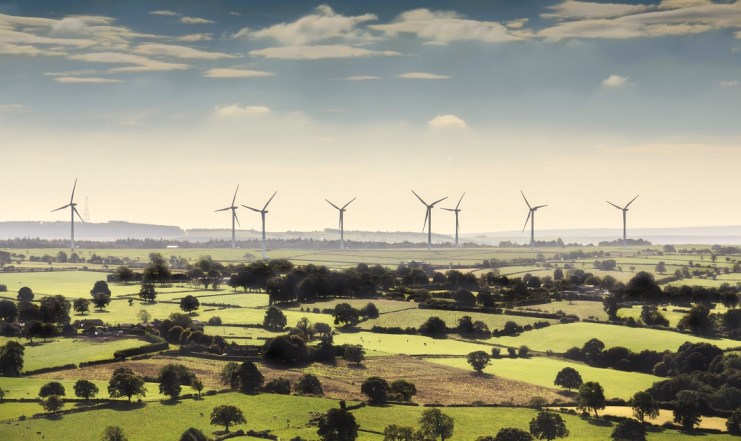Energy industry backs Ofgem’s net zero role in bid to ramp up renewables

The energy sector has welcomed the government’s move to expand Ofgem’s remit and legally require the watchdog to help drive the UK towards net zero carbon emissions over the next three decades.
This will effectively expand its role as a regulator as the government aims to boost renewable electricity generation in line with its energy security goals – which include targets 50GW of offshore wind by 2030 and 70GW of solar power by 2035.
Conservative MP Chris Skidmore said he was “delighted” with the decision, which was proposed in his review of net zero published earlier this year.
He told City A.M.: “Far too many renewable projects are delayed because they can’t connect to the grid, slowing the clean energy rollout. Expanding Ofgem’s remit to include net zero will push networks to upgrade proactively, bringing more projects online sooner and ultimately cutting energy bills and our emissions.”
The environmentally-focused politician hoped that Ofgem being granted statutory net zero duty should “now” empower them to make some much-needed changes to the UK’s energy system.”
He said: “If we can clear up the grid queue with some distinct and clear regulation around investment and readiness to develop, more renewables can spring forth and bills will already start coming down by the end of the year.
“Only then can we start to pull away from our reliance on imported gas and make Britain truly energy independent.”
Industry reaction
Wind and solar industry bodies Renewable UK and Solar Energy UK also backed the latest reforms, anticipating they could speed up long delays with grid connections – as Ofgem would have more authority to push through rule changes across the energy sector.
Renewable UK’s director of future electricity systems Barnaby Wharton said: “Some offshore wind projects are having to wait for more than 10 years to get a grid connection. This measure will help to unlock at least £15bn of investment in offshore wind alone between now and the end of the decade.
“This was a common-sense decision by the government,” added Chris Hewett, chief executive of Solar Energy UK.
Meanwhile, renewables player Octopus Energy Generation also backed the decision.
Zoisa North-Bond, chief executive, said: “If we can clear up the grid queue with some distinct and clear regulation around investment and readiness to develop, more renewables can spring forth and bills will already start coming down by the end of the year. Only then can we start to pull away from our reliance on imported gas and make the UK truly energy independent.”
Ofgem was also supportive of its expanded role, and chief executive Jonathan Brearley argued that the “mandate sends a clear message we must end our historic dependency on fossil fuels and stop our exposure to volatile global markets.”
However ,former head of energy at BEIS and head of policy Adam Bell offered a dissenting take amid the largely collective praise.
He said: “The acid test here is what decisions can you point to that would be taken differently under this duty. Ofgem has already, following considerable political pressure, started making more rapid decisions on the transmission network connections needed for net zero.
“It still can’t make decisions about e.g. infrastructure needed for heat decarbonisation because the government hasn’t decided what it wants to do yet, and doesn’t plan to until 2026. And even then, I heartily expect fudge.”
Government confirms Ofgem amendment
The latest reaction from across the energy sector follows the government today confirming an amendment to the upcoming energy bill, which will upgrade Ofgem’s target to empower the regulator to help overhaul the energy sector.
It has added a specific duty to supporting the government to meet its legal obligation to get to net zero by 2050, supported by the Climate Change Act 2008.
The watchdog previously held a general statutory duty to protect consumers’ interests through the reduction of greenhouse gases emissions in the supply of electricity and gas – rather than any specific climate target.
This will come into force two months after the Energy Bill if it gets royal assent, if approved by parliament.
The bill is centred around energy production and security and the regulation of the market.
It awaits a third and final reading in the House of Commons – and could come into force by September.
At the moment, the legislation is currently at committee stage in the Commons.
The move effectively will shift Ofgem’s priorities towards encouraging investment in new green infrastructure although it will continue its role of overseeing the retail energy market, which is already beholden to environmental rules such as renewable obligation payments.
There is the possibility this could lead to higher bills, as the objective of keeping bills low has slowed the pace of investment by electricity network operators into new lines, transformers and switchgear.
However, it could also allow the watchdog to help support technologies such as renewable energy storage which could significantly lower bills over time.
After initial scepticism, energy secretary Grant Shapps has reportedly become increasingly concerned that without the legal obligations, Ofgem lacks the power the reform the industry and break the logjams holding back the development of new wind turbines, transmissions cables and pylons.
The amendment was published by Andrew Bowie, the junior minister responsible for energy systems and networks.
He said: “Ofgem’s principal objective is to protect the interests of existing and future consumers. The regulator’s remit must also adapt so it is empowered to build the energy system of the future.”